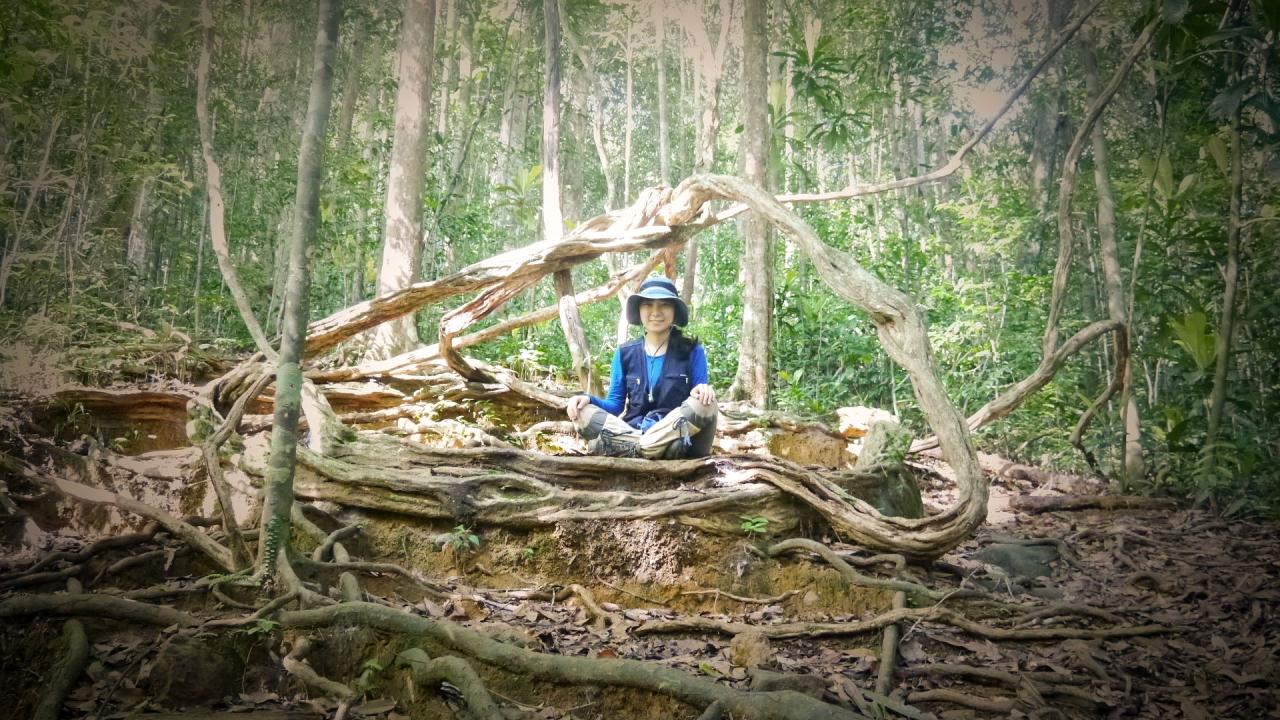
Meet Jaeeun Sohng
Jaeeun Sohng is an Earth Scholar at the UC Davis Institute of the Environment. Sohng recently earned her Ph.D. in the Soils and Biogeochemistry Graduate Group at UC Davis and is currently continuing her research as a postdoctoral scholar at the UC Davis Institute of the Environment. Her work investigates how Enhanced Rock Weathering (ERW), combined with organic carbon inputs, affects microbial activity, carbon dynamics, and soil carbon sequestration in agricultural soils.
What led you to want to study and research environmental solutions?
Jaeeun Sohng: My love of plants initially led me to study plant biology. But as I learned more, I realized that my true passion wasn’t just for the plants themselves — it was for where they grow: the soil. This realization led me to join a soil lab during my undergraduate studies at the University of Seoul in Korea, where I was introduced to hands-on experiments and analytical techniques for studying soil. That experience became a turning point.
Over time, my focus shifted entirely to soil — a complex and dynamic medium that, like water, connects everything. I didn’t set out to become an environmental scientist, but my passion for understanding soil’s role in broader environmental systems has only deepened. Soils are at the heart of cycling energy, nutrients, and carbon — all fundamental to life and climate. That realization continues to drive my commitment to researching soil-based solutions for environmental challenges.
What are your most significant research accomplishments?
Jaeeun Sohng: Prior to my current Ph.D. and postdoctoral work, one of my most memorable research accomplishments was my time as a research scientist at Yale, where I spent two years investigating the environmental impacts of hydraulic fracturing (fracking) on groundwater systems in the Marcellus Shale region. We conducted monthly field campaigns, collecting groundwater samples from deep wells to track changes in water quality and carbon-related indicators before, during, and after shale gas development. Through this work, I gained hands-on experience in environmental field research — learning how to collect and interpret evidence from below the surface to better understand risks to water, ecosystems, and surrounding communities. It was a formative experience that showed me the power of applied science to address real-world challenges. The project also reshaped the way I think about the deep connections between soil at geological depths, the water system — from surface waters all the way to the deepest aquifers, and the people who rely on these systems. It gave me confidence in the value of research that bridges science and society.
This experience was especially meaningful to me on a personal level. It marked a turning point — a moment of affirmation that I was on the right path in a journey that began with immigrating from Korea, starting over at a U.S. community college, and steadily building a life and career rooted in curiosity, resilience, and care for the world around me.
What do you hope to achieve with your research?
Jaeeun Sohng: My current research focuses on a globally urgent goal: removing carbon dioxide from the atmosphere. Unlike plant photosynthesis, engineered carbon removal methods are often expensive and complex. I study how we can enhance natural processes — such as rock weathering and soil microbial activity — to draw down carbon in a more scalable, nature-based way, known as enhanced rock weathering. During my Ph.D., I investigated how these processes interact in real agricultural soils and whether carbon is being sequestered as expected. With growing investment in this approach from the carbon market, the science is evolving rapidly. I hope my research can contribute actionable insights to support responsible deployment — and, more broadly, help integrate soil-based carbon removal into effective climate solutions.
How has your research influenced your thinking?
Jaeeun Sohng: Initially, I wasn’t fully aware of how central carbon is to everything — I only understood it in the context of soil processes. But through my research, I began to see how soil carbon is intricately connected to the food system, atmospheric CO₂, and ultimately, to the larger cycles of life. It’s made me reflect more deeply on my place in this cycle — not just scientifically, but energetically and even spiritually. My work shows evidence of this: we eat carbon, we respire carbon, the food we eat comes from the soil, but that food only exists because plants fix carbon from the air using sunlight. That carbon returns to the soil and is broken down by microbes, releasing nutrients for the next cycle. It’s incredibly humbling and fascinating to realize that carbon really is everywhere — and we are part of that story.
How do you stay motivated with the recent rollbacks in environmental research?
Jaeeun Sohng: I stay motivated by grounding myself in gratitude and focusing on what’s within my control. I feel fortunate to be doing meaningful work — to be supported, for now, in researching climate solutions alongside people who care deeply about these issues. That sense of gratitude keeps me centered. I try not to spiral into frustration or fear, but instead ask myself: what can I do right now, with what’s on my plate? Focusing on the immediate and the tangible helps me stay present and grounded. And above all, I trust the process. Looking back on my academic and immigration journey, everything has unfolded in ways I never could have imagined — but always in ways that have deepened my growth and perspective.